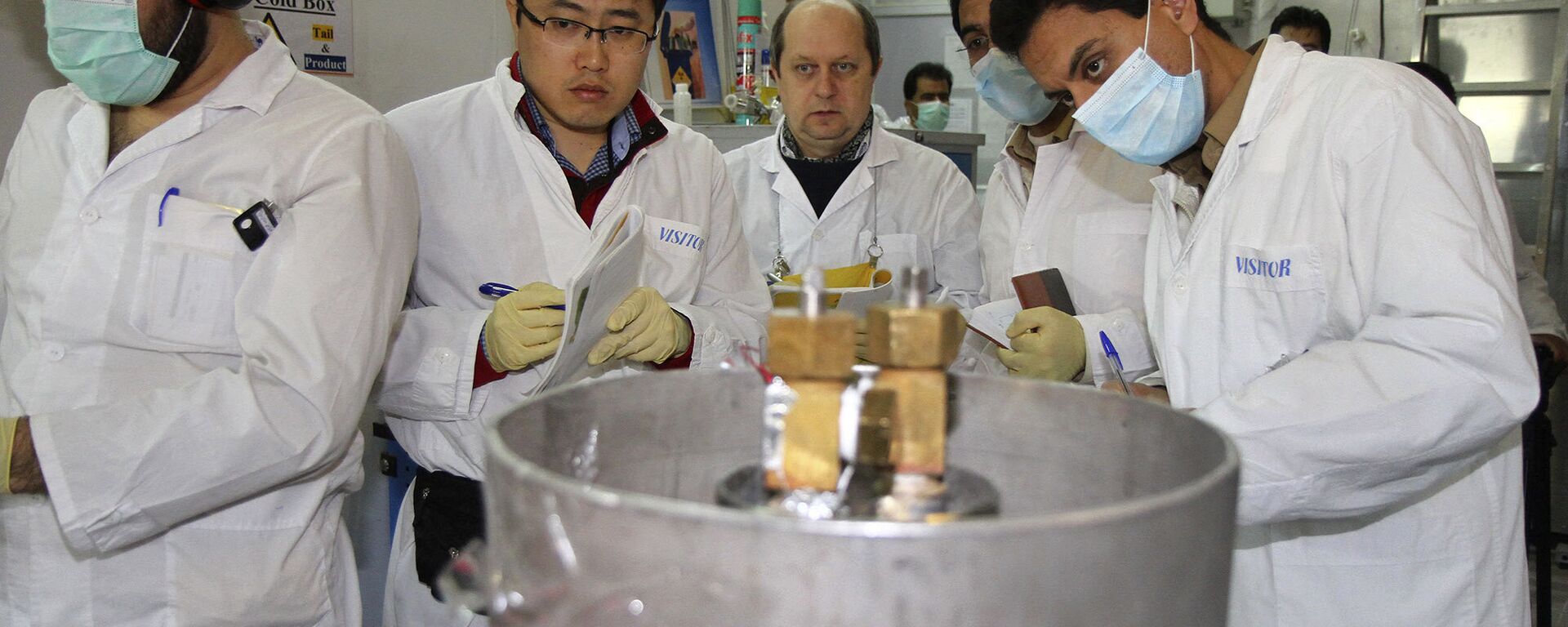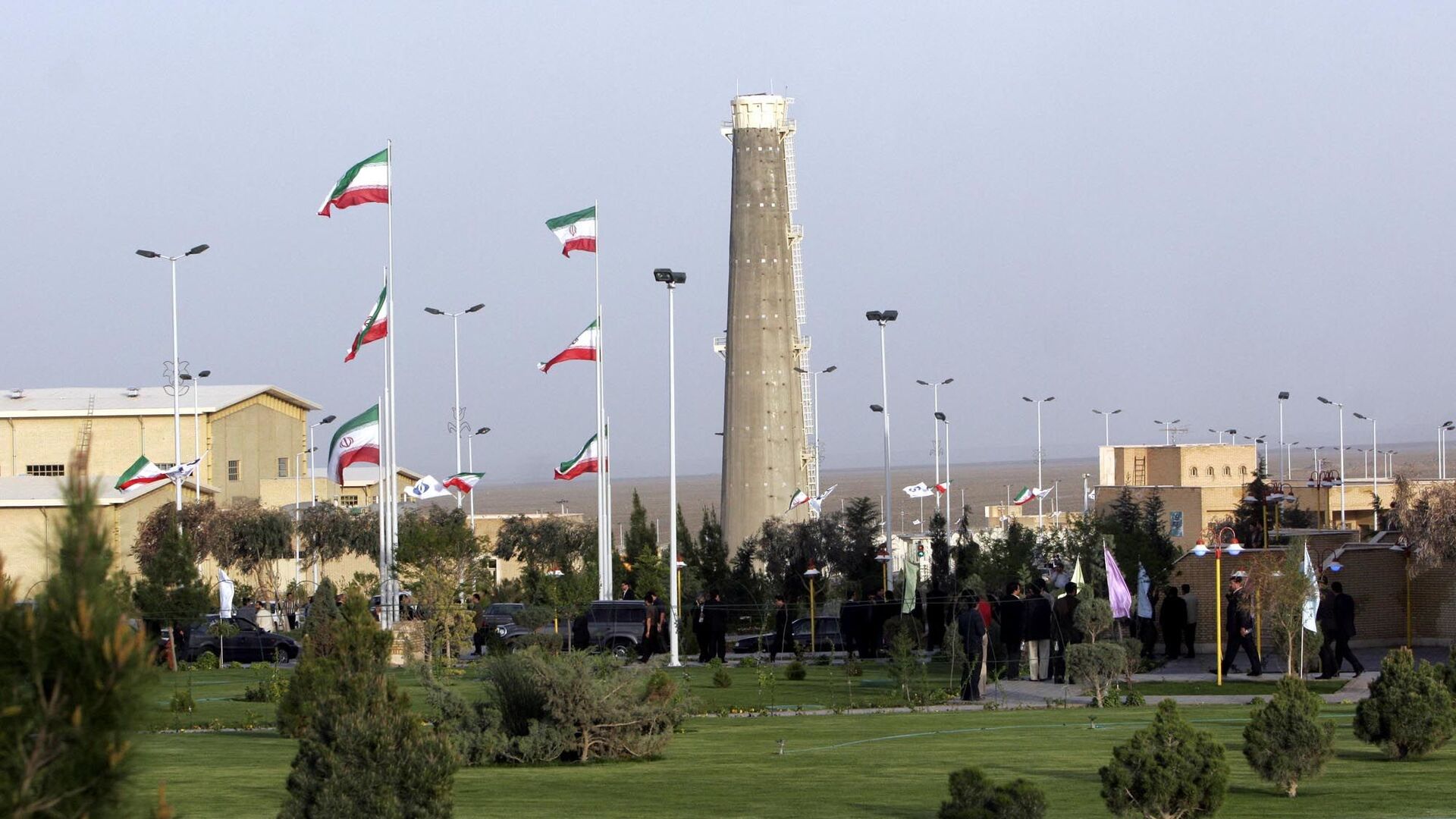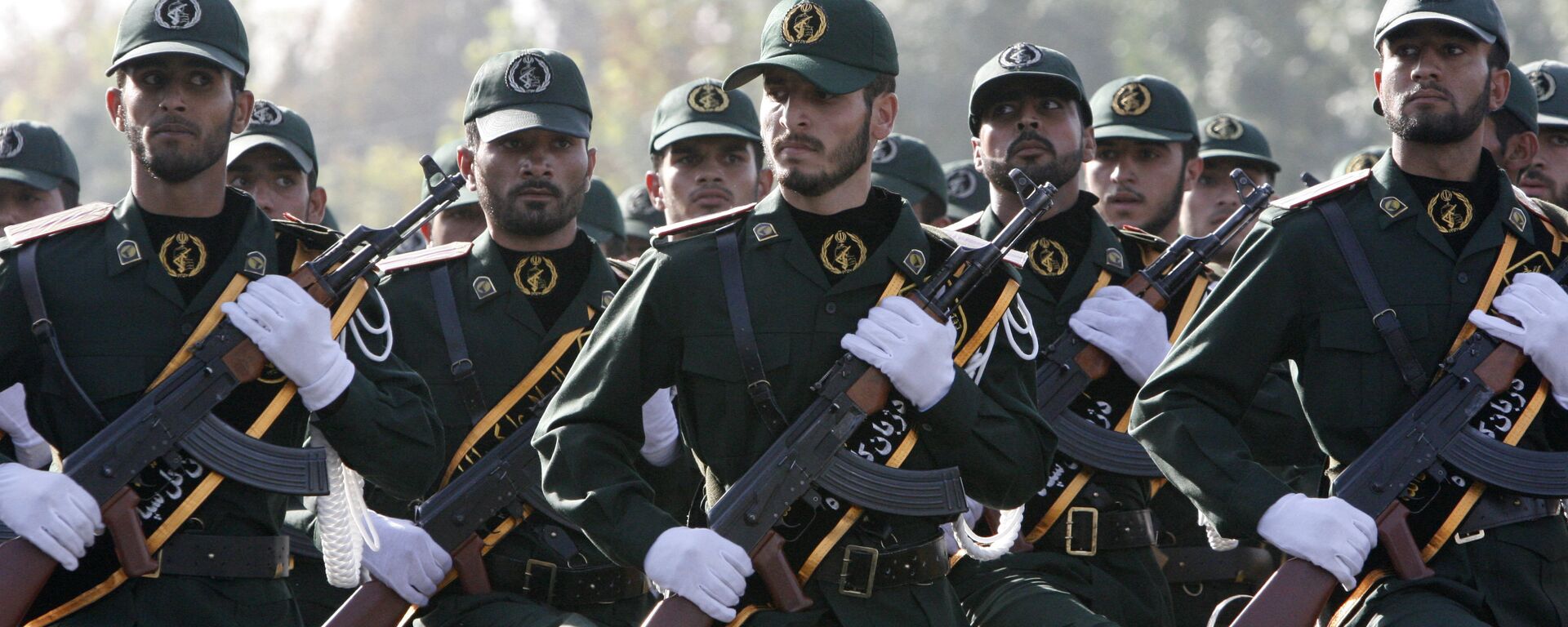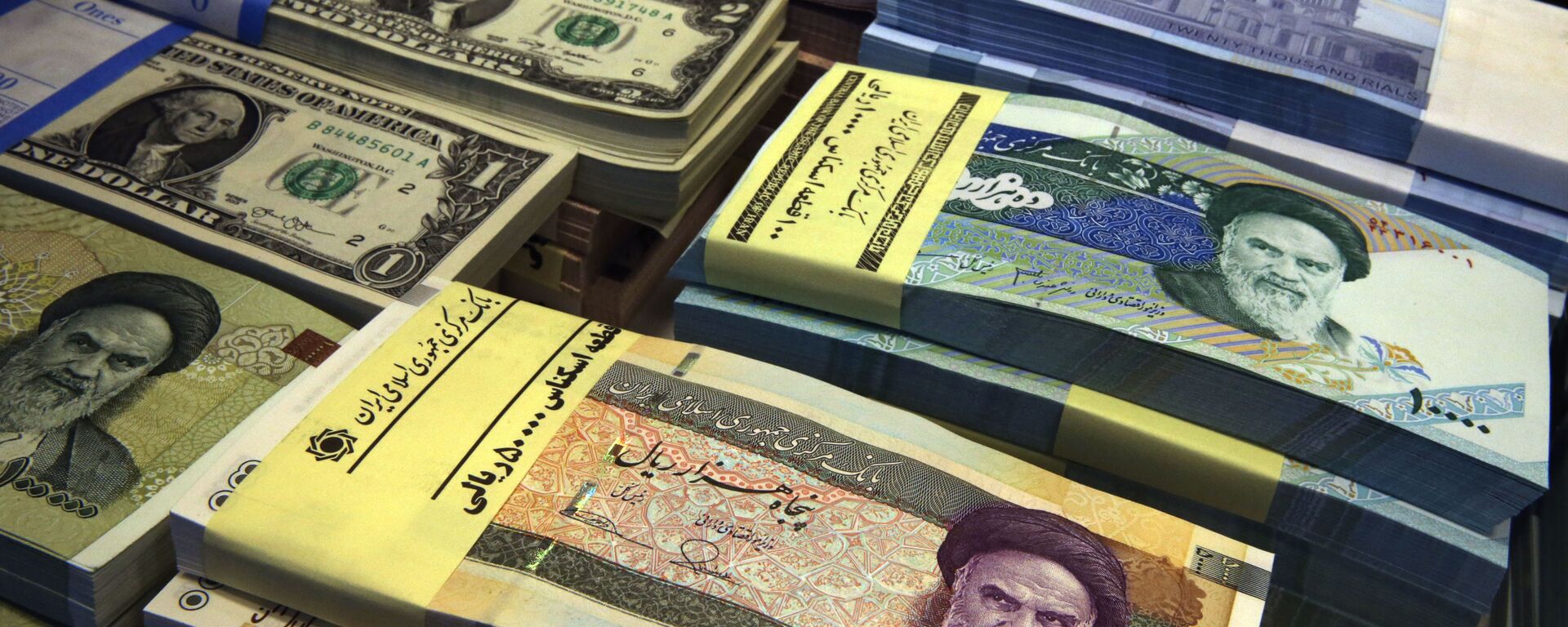https://sputnikglobe.com/20220721/observers-cia-chiefs-bombshell-remark-confirms-us-anti-iran-sanctions-were-never-backed-by-proof-1097670080.html
Observers: CIA Chief's Bombshell Remark Confirms US Anti-Iran Sanctions Were Never Backed by Proof
Observers: CIA Chief's Bombshell Remark Confirms US Anti-Iran Sanctions Were Never Backed by Proof
Sputnik International
US CIA Director William Burns acknowledged on July 20 that the US intelligence community knew the Iranians had not resumed the weaponization effort that they... 21.07.2022, Sputnik International
2022-07-21T18:31+0000
2022-07-21T18:31+0000
2022-12-07T10:18+0000
middle east
russia
iran
joint comprehensive plan of action (jcpoa)
us withdraws from iran nuclear deal
us
cia
nuclear program
nuclear weapons
https://cdn1.img.sputnikglobe.com/img/07e4/0c/02/1081337820_0:104:2000:1229_1920x0_80_0_0_bda6966b2e7ebe6d5d96244a5f2f2e4e.jpg
"Sanctions on Iran are not driven by facts, consideration of its fallout or by likelihood of success, but by domestic politics in the United States," says Hossein Askari, Aryamehr professor of international business at George Washington University. "Iran has been demonized by the Israeli and Arab lobby [in the US]. Money is poured into the coffers of politicians who attack Iran for whatever reason. Even if Iran did not have a nuclear program, politicians would find another reason to sanction Iran."Iran's nuclear program was launched in 1957 under Mohamed Reza Shah’s rule within the framework of Washington's Atoms for Peace initiative. At the time, Washington and Tehran concluded a nuclear arrangement known as Cooperation Concerning Civil Uses of Atoms. In 1967, the US supplied a five-megawatt nuclear research reactor along with highly enriched uranium to Iran, while in 1975, the Atomic Energy Organization of Iran (AEOI) struck an agreement with the Massachusetts Institute of Technology (MIT) to provide Iranians with scientific and technological training on nuclear energy.In the wake of the 1979 Islamic Revolution, the US halted its civilian nuclear cooperation agreement with Iran and has since then as tried to hinder the country's atomic program together with its allies.After the revolution, the United States pointed to Iran as one of the primary threats to its own interests and the interests of its regional allies, according to Mehran Kamrava, professor of government at Georgetown University Qatar.The Islamic Revolution stoked Washington's fears that Iran's growing influence would curtail US dominance in the Middle East, according to Sami Hamdi, political analyst and head of the International Interest, a risk analysis group. "I think the [US] sanctions have more to do with Iran's ambitions in the region rather than its nuclear program," the political analyst suggests.Nonetheless, the Iran nuclear program proceeded with Abdul Qadeer Khan, a Pakistani nuclear physicist, secretly providing Tehran in the 1980s with designs of a P-1 centrifuge which was instrumental in enriching uranium and some samples of centrifuge components. In 2001, the construction of the Natanz enrichment facilities began.Later, the IAEA claimed that Iran had conducted experiments aimed at designing a nuclear weapon until 2003. However, in 2007, the US Office of the Director of National Intelligence admitted that Iran had completely halted its alleged nuclear weapons program in the fall of 2003. Moreover, in 2003, Iranian Supreme Leader Ali Khamenei issued a fatwa (a formal Islamic ruling) forbidding the production and use of any form of weapon of mass destruction (WMD) by the country.CIA Director William Burns revealed on July 20 that since 2004, Iran has made zero effort to create nuclear weapons, contrary to claims by proponents of sanctions and maximum pressure against Tehran.Why Legal Guarantees for JCPOA are ImportantBurns' shock announcement is unlikely to influence Joe Biden's Iran policies, according to Kamrava.Upon assuming office, US President Joe Biden kicked off indirect negotiations with Iran in order to revive the 2015 nuclear deal unilaterally torn apart by his predecessor, Donald Trump, in 2018. However, Tehran and Washington's negotiations have repeatedly stalled, with the US refusing to take the first step and lift Trump's "maximum pressure" sanctions on Iran unless Tehran scales back its uranium enrichment activities. Following the US demarche in 2018, the Islamic Republic has been gradually loosening the JCPOA terms on uranium enrichment from under 5% to 60% starting from July 2019 in a bid to force US and European JCPOA participants to respect and observe their own obligations.The latest round of indirect nuclear talks aimed at reviving the 2015 Joint Comprehensive Plan of Action, commonly referred to as the Iran nuclear deal, ended on June 29 in Doha, Qatar, without any progress.While US officials claimed that the Iranians "raised old issues that have been settled for months, and even raised new issues that are unrelated to the 2015 nuclear agreement," Iran's Foreign Minister Hossein Amir-Abdollahian shredded the allegations. "We do not have any excessive demands or demands beyond the JCPOA, and our demands are completely within the framework of the 2015 agreement," he said as quoted by Mehr News Agency.Amir-Abdollahian emphasized that Tehran is seeking legal guarantees from the US that it will remain committed to the revived JCPOA and that Iran will get full economic benefits under the deal. In the eyes of the US State Department, the JCPOA is not a treaty or an executive agreement. It could have become one if it were submitted to the US Congress for approval. President Barack Obama did not do this and his successor easily withdrew from the accords. The Biden administration is resisting providing legal guarantees to Iran, which makes the deal vulnerable to assertive actions from a new US administration. However, even if Biden wanted to get congressional approval for the Iran nuclear deal in a deeply polarized Congress, he would hardly get one, according to Al-Monitor.Why Sanctions Inevitably BackfireWhile the Biden administration has yet to lift Trump's sanctions on Iran, it appears to be eager to introduce new ones. In early July, the Biden administration unveiled a fresh round of Iran-related restrictions targeting "an international network of individuals and entities" which apparently facilitated the sale of US-sanctioned Iranian oil and petrochemical products to East Asia.Secretary of State Antony Blinken blamed Iran for the lack of progress during the nuclear talks. "Absent a change in course from Iran, we will continue to use our sanctions authorities to target exports of petroleum, petroleum products, and petrochemical products from Iran," he said.Economic sanctions have become the default setting for the West when dealing with what it considers to be undesirable states. However, when the target country is a key exporter of a scarce commodity in high demand, such as rare earth metals, natural gas, or oil, the sanctions regime usually backfires on its initiators, according to Hossein Askari.According to Askari, there is a chance of China, Russia, Iran, and a few other countries banding together, completely shifting to national currencies and refusing to accept dollars as payment. "If this were to happen, it would impose a heavy price on the United States," he says.
https://sputnikglobe.com/20190904/unseen-war-what-message-does-exposure-of-eu-involvement-in-2007-us-israeli-cyber-op-send-to-iran-1076717815.html
https://sputnikglobe.com/20210621/raisis-win-ushers-in-an-era-of-a-more-confident--united-iran-security-analyst-says-1083199941.html
https://sputnikglobe.com/20220608/irans-shanghai-pact-single-currency-proposal-may-undermine-impact-of-us-sanctions-expert-says-1096130180.html
iran
Sputnik International
feedback@sputniknews.com
+74956456601
MIA „Rossiya Segodnya“
2022
News
en_EN
Sputnik International
feedback@sputniknews.com
+74956456601
MIA „Rossiya Segodnya“
Sputnik International
feedback@sputniknews.com
+74956456601
MIA „Rossiya Segodnya“
middle east, iran, joint comprehensive plan of action (jcpoa), us withdraws from iran nuclear deal, us, cia, nuclear program, nuclear weapons
middle east, iran, joint comprehensive plan of action (jcpoa), us withdraws from iran nuclear deal, us, cia, nuclear program, nuclear weapons
Observers: CIA Chief's Bombshell Remark Confirms US Anti-Iran Sanctions Were Never Backed by Proof
18:31 GMT 21.07.2022 (Updated: 10:18 GMT 07.12.2022) US CIA Director William Burns acknowledged on July 20 that the US intelligence community knew the Iranians had not resumed the weaponization effort that they had underway until 2004 and then suspended. This means that Washington slapped sanctions on Iran with no evidence of Tehran violating the 2015 nuclear accords.
"Sanctions on Iran are not driven by facts, consideration of its fallout or by likelihood of success, but by domestic politics in the United States," says Hossein Askari, Aryamehr professor of international business at George Washington University. "Iran has been demonized by the Israeli and Arab lobby [in the US]. Money is poured into the coffers of politicians who attack Iran for whatever reason. Even if Iran did not have a nuclear program, politicians would find another reason to sanction Iran."
Iran's nuclear program was
launched in 1957 under Mohamed Reza Shah’s rule within the framework of Washington's Atoms for Peace initiative. At the time, Washington and Tehran concluded a nuclear arrangement known as Cooperation Concerning Civil Uses of Atoms. In 1967, the US supplied a five-megawatt nuclear research reactor along with highly enriched uranium to Iran, while in 1975, the Atomic Energy Organization of Iran (AEOI) struck an agreement with the Massachusetts Institute of Technology (MIT) to provide Iranians with scientific and technological training on nuclear energy.
In the wake of the 1979 Islamic Revolution, the US halted its civilian nuclear cooperation agreement with Iran and has since then as tried to hinder
the country's atomic program together with its allies.

4 September 2019, 06:00 GMT
After the revolution, the United States pointed to Iran as one of the primary threats to its own interests and the interests of its regional allies, according to Mehran Kamrava, professor of government at Georgetown University Qatar.
"The US had sanctioned Iran following the storming of the American Embassy in Tehran by Iranian revolutionaries [on November 4, 1979]," Kamrava says. "So, vilifying Iran played well with domestic audiences, and it was a low-cost way of punishing Iran and imposing great economic costs on the country. With time, the US has become determined to impose ever more expansive and harsh sanctions on the country in the hope of eventually fostering a popular rebellion that would result in the collapse of the present system in Iran."
The Islamic Revolution stoked Washington's fears that Iran's growing influence would curtail US dominance in the Middle East, according to Sami Hamdi, political analyst and head of the International Interest, a risk analysis group. "I think the [US] sanctions have more to do with Iran's ambitions in the region rather than its nuclear program," the political analyst suggests.
Nonetheless, the Iran nuclear program proceeded with Abdul Qadeer Khan, a Pakistani nuclear physicist, secretly providing Tehran in the 1980s with designs of a P-1 centrifuge which was instrumental in enriching uranium and some samples of centrifuge components. In 2001, the construction of the Natanz enrichment facilities began.
Later, the IAEA
claimed that Iran had conducted experiments aimed at designing a nuclear weapon until 2003. However, in 2007, the US Office of the Director of National Intelligence
admitted that Iran had completely halted its alleged nuclear weapons program in the fall of 2003. Moreover, in 2003, Iranian Supreme Leader Ali Khamenei issued a fatwa (a formal Islamic ruling) forbidding the production and use of any form of weapon of mass destruction (WMD) by the country.
CIA Director William Burns revealed on July 20 that since 2004, Iran has made zero effort to create nuclear weapons, contrary to claims by proponents of sanctions and maximum pressure against Tehran.
"Our best intelligence judgment is that the Iranians have not resumed the weaponization effort that they had underway up until 2004 and then suspended," Burns said at the Aspen Security Forum.
Why Legal Guarantees for JCPOA are Important
Burns' shock announcement is unlikely to influence Joe Biden's Iran policies, according to Kamrava.
"The US sees little incentive to lighten sanctions on Iran," the professor says. "The Biden administration itself does [not] have the desire or willpower to do so, and even if it did, it would still not have the courage or the political capital to stand up to the Republicans, who tend to be even more determined Iranophobes. Unfortunately, I do not see any prospect for a reduction of US sanctions on Iran."
Upon assuming office, US President Joe Biden kicked off indirect negotiations with Iran in order to revive the 2015 nuclear deal unilaterally torn apart by his predecessor, Donald Trump, in 2018. However, Tehran and Washington's negotiations have repeatedly stalled, with the US refusing to take the first step and lift Trump's "maximum pressure" sanctions on Iran unless Tehran scales back its uranium enrichment activities. Following the US demarche in 2018, the Islamic Republic has been gradually loosening the JCPOA terms on uranium enrichment from under 5% to 60% starting from July 2019 in a bid to force US and European JCPOA participants to respect and observe their own obligations.
The latest round of indirect nuclear talks aimed at reviving the 2015 Joint Comprehensive Plan of Action, commonly referred to as the Iran nuclear deal, ended on June 29 in Doha, Qatar, without any progress.
While US officials
claimed that the Iranians "raised old issues that have been settled for months, and even raised new issues that are unrelated to the 2015 nuclear agreement," Iran's Foreign Minister Hossein Amir-Abdollahian shredded the allegations. "We do not have any excessive demands or demands beyond the JCPOA, and our demands are completely within the framework of the 2015 agreement," he said as
quoted by Mehr News Agency.
Amir-Abdollahian emphasized that Tehran is seeking legal guarantees from the US that it will remain committed to the revived JCPOA and that Iran will get full economic benefits under the deal.
In the eyes of the US State Department, the JCPOA is not a treaty or an executive agreement. It could have become one if it were submitted to the US Congress for approval. President Barack Obama did not do this and his successor easily withdrew from the accords. The Biden administration is resisting providing legal guarantees to Iran, which makes the deal vulnerable to assertive actions from a new US administration. However, even if Biden wanted to get congressional approval for the Iran nuclear deal in a deeply polarized Congress, he would hardly get one,
according to Al-Monitor.
Why Sanctions Inevitably Backfire
While the Biden administration has yet to lift Trump's sanctions on Iran, it appears to be eager to introduce new ones. In early July, the Biden administration unveiled a fresh round of Iran-related restrictions targeting "an international network of individuals and entities" which apparently facilitated the sale of US-sanctioned Iranian oil and petrochemical products to East Asia.
Secretary of State Antony Blinken blamed Iran for the lack of progress during the nuclear talks. "Absent a change in course from Iran, we will continue to use our sanctions authorities to target exports of petroleum, petroleum products, and petrochemical products from Iran," he said.
Economic sanctions have become the default setting for the West when dealing with what it considers to be undesirable states. However, when the target country is a key exporter of a scarce commodity in high demand, such as rare earth metals, natural gas, or oil, the sanctions regime usually backfires on its initiators, according to Hossein Askari.
"Also, over time, economic and financial conditions and national alliances change, undermining the sanctions regime," the professor says. "This blowback could impose a serious burden on the sender of the sanctions, with higher prices of imported commodities, financial instability and force it to rescind the sanctions."
According to Askari, there is a chance of China, Russia, Iran, and a few other countries banding together, completely shifting to national currencies and refusing to accept dollars as payment. "If this were to happen, it would impose a heavy price on the United States," he says.
"We already see countries such as Iran, Russia, and China move to devise alternatives to Western and American trade, technologies, and banking mechanisms such as SWIFT," Mehran Kamrava echoes. "This is a long term development, but it is quite likely that the sanctions work to reduce dependency on the dollar, create alternative trading partners and trade blocs, and result in the development of domestic industries that produce goods that were previously imported."







